Life

9 Ways Bed Sharing Affects Your Kid's Personality
Whether you intentionally practice is because you follow attachment parenting or fell into the habit because you're too tired to fend off your little one, you may have found that sharing your bed with your child is the best fit for you. Still, you might occasionally find yourself wondering if there are ways bed sharing affects your kid's personality. Does opening up your family bed to your children actually have any impact on how their character is shaped? As with any choice a person makes in how they parent, there are bound to be haters. So it's not surprising that bed sharing gets its fair share of flack, too.
Arguably one of the top concerns of naysayers and parents alike is whether or not co-sleeping is safe in the first place. According to the American Academy of Pediatrics (AAP), co-sleeping or the form of it known as bed sharing can be done safely, so long as parents take preventative measures. But what about once your child is out of the baby stage and is going full speed towards toddler-hood? Does bed sharing still play a role in how a child's disposition develops?
Whether you have a family bed or you're just curious, check out these interesting ways that bed sharing can actually affect your kid's personality.
1They're Independent
You might think that because an infant or child shares a bed with their parent, they would exhibit signs of co-dependency. As it turns out, that likely won't be the case. According to the University of Notre Dame's Mother-Baby Sleep Behavioral Sleep Laboratory, bed sharing, "leads to early independence, self-sufficiency and, enhanced self–confidence." Perhaps the closeness and comfort of bed sharing serves as a solid foundation for a child's journey to independence.
2They're Socially Comfortable
It's no surprise that research has found that bed sharing tends to lead to children who are comfortable around others, socially and physically. A study led by clinical psychologist Dr. C. Joanne Crawford found that bed sharing produced children who were well-adjusted in terms of both affection and social integration. Having a healthy understanding of personal and shared space seems key.
3They Can Deal
My mom always told me that carrying yourself with confidence was the first step towards learning how to handle life as an adult. Interestingly enough, science seems to back my mother up on that one. Dr. James McKenna, a sleep expert and author, told Baby Center, "children who sleep share are more confident, and, as adults, have better stress-management skills." Believing in yourself definitely helps to combat any stressful situations which may arise.
4They're Happy
You know that joke about love being like a drug? It's not so far-fetched after all. Cuddling really does give you a loving feeling. Dr. Darcia Narvaez, professor of psychology at the University of Notre Dame, told The Independent, that" sleeping close to the parent increases oxytocin, the ‘happy hormone.’” Who wouldn't want to be around the happy hormone?
5They're Helpful
It stands to reason that if you're sharing a bed with your child, you're going to be more likely to immediately respond to and meet their needs—whether that means breastfeeding, cuddling, or anything else. Clinical psychologist Dr. Laura Markham told Aha! Parenting, "babies whose needs are fully met become more cooperative and agreeable." It's not surprising that the reciprocal nature of bed sharing would lend itself to producing children with a sunny, helpful disposition.
6They Do Well In School
Combining happiness, helpfulness, and strong social skills, it's no wonder that another way bed sharing affects your kid's personality is how they behave in school. According to an article written by pediatrician and parenting expert, Dr. William Sears, a long term effect of bed sharing shows that children tend to do well in school. Of course, all children are different and not every educational environment provides the same opportunities for fostering growth.
7They're Not As Anxious
Perhaps since children who sleep in their parents' bed are within arm's reach after a bad dream or hearing scary noises, they're not as prone to fearfulness later in life. According to Notre Dame's Mother-Baby Sleep Behavioral Sleep Laboratory, kids who co-sleep with their parents between birth and five years experienced less guilt and anxiety later in life. It's good to remember, though, that anxiety can happen to anyone regardless of how they were raised.
8They're Content
According to a study led by Dr. Thomas McDade, a biological anthropologist, "co-sleepers exhibited a general feeling of satisfaction with life." That sounds good to me.
9They Feel Accepted
Pretty much all parents hope that their children will feel loved and accepted, and perhaps bed sharing is one way to achieve that. According to Healthy Child, children who slept in the same bed as their parents often grew up to feel a greater sense of parental acceptance. Forming a strong parent-child connection early on could set the stage for a healthy relationship later in life, too.